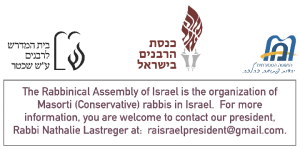
This week marked 9 months since October 7th. Nine months of war. Nine months during which 120 of our brothers and sisters have been held hostage in Gaza. Nine months of deep crisis.
The Hebrew word for “crisis” is מַשְׁבֵּר / mashber* and can take on additional meanings. Thus wrote Moshe Ibn Ezra (11th century Spain):
“Constantly, as a woman in childbirth sitting on the birthing stool [“mashber”]
“Land in the heart of the sea of my tears that drown / waves of persistent crisis [“mashber”] pass overhead.”
Ibn Ezra is referring to two different understandings of the word מַשְׁבֵּר / mashber. The first, the birthing stool and the second a wave of water, like the familiar phrase “mishb’rei yam” in Psalm 93 (which we recite during the preliminary service on Shabbat and festival mornings), each referring to suffering and to human challenge. In both cases, a crisis is a moment of pain, difficulty and anxiety, but at the same time it is one that enables growth, and bringing new [or renewed] life into the world.
The current crisis, indeed, is not yet behind us, and yet there is the hope that brokenness and crises will give birth to strength and renewed life.
*based on the three letter root שבר around which nouns, adjectives and verbs about brokenness are formed.
